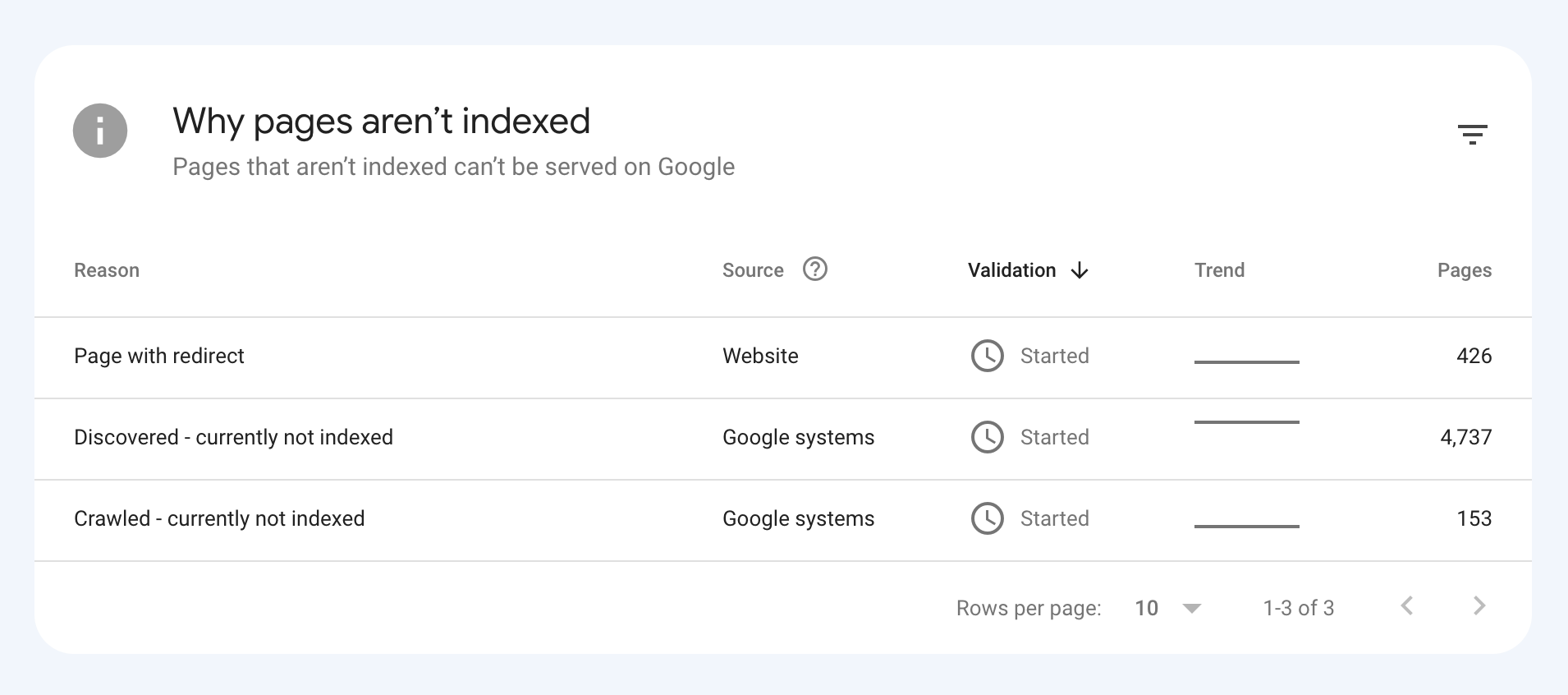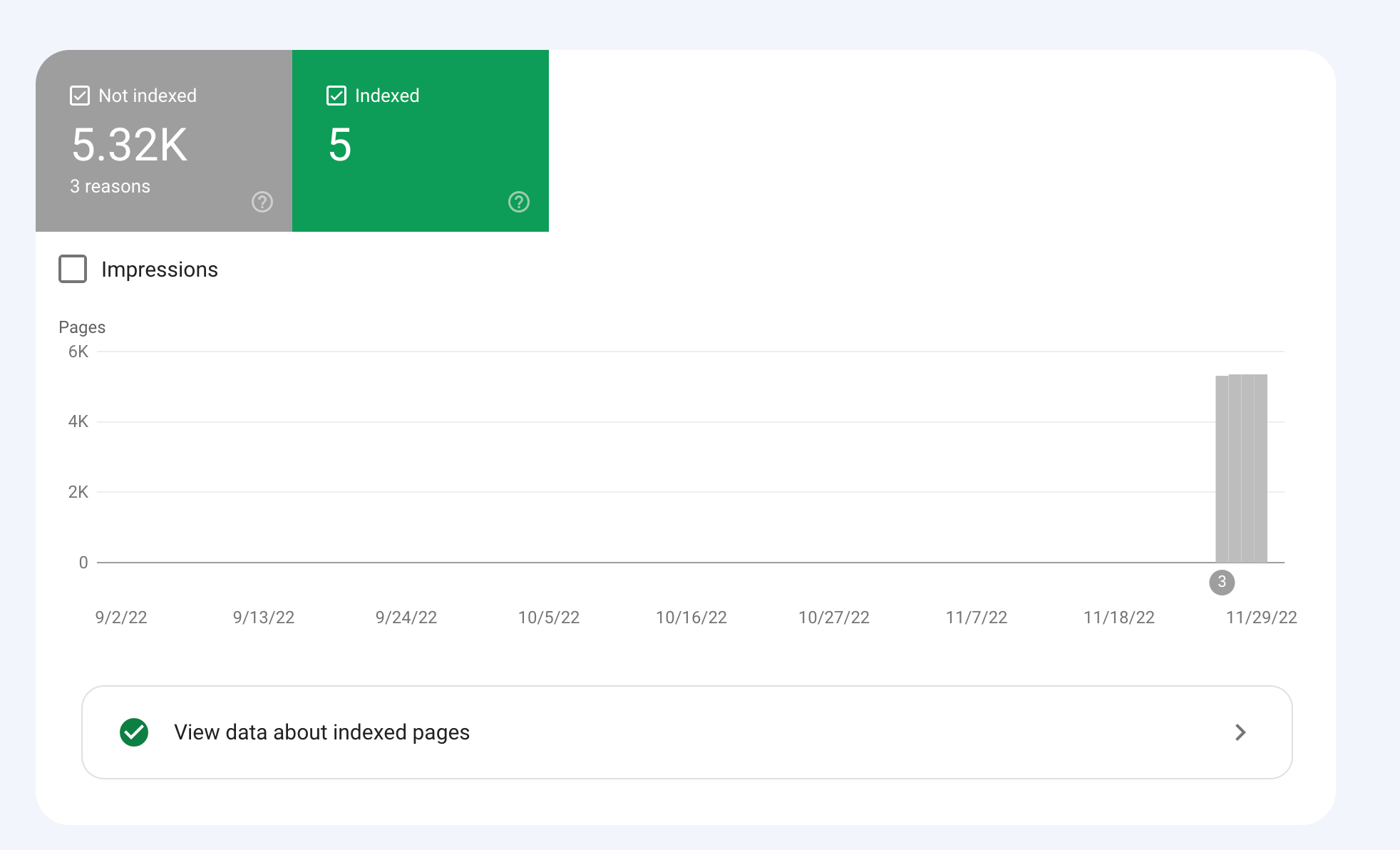Moz Q&A is closed.
After more than 13 years, and tens of thousands of questions, Moz Q&A closed on 12th December 2024. Whilst we’re not completely removing the content - many posts will still be possible to view - we have locked both new posts and new replies. More details here.
How to index e-commerce marketplace product pages
-
Hello!
We are an online marketplace that submitted our sitemap through Google Search Console 2 weeks ago. Although the sitemap has been submitted successfully, out of ~10000 links (we have ~10000 product pages), we only have 25 that have been indexed.
I've attached images of the reasons given for not indexing the platform.


How would we go about fixing this?
-
To get your e-commerce marketplace product pages indexed, make sure your pages include unique and descriptive titles, meta descriptions, relevant keywords, and high-quality images. Additionally, optimize your URLs, leverage schema markup, and prioritize user experience for increased search engine visibility.
-
@fbcosta i hve this problem but its so less in my site
پوشاک پاپیون -
I'd appreciate if someone who faced the same indexing issue comes forward and share the case study with fellow members. Pin points steps a sufferer should do to overcome indexing dilemma. What actionable steps to do to enable quick product indexing? How we can get Google's attention so it can start indexing pages at a quick pace? Actionable advice please.
-
There could be several reasons why only 25 out of approximately 10,000 links have been indexed by Google, despite successfully submitting your sitemap through Google Search Console:
Timing: It is not uncommon for indexing to take some time, especially for larger sites with many pages. Although your sitemap has been submitted, it may take several days or even weeks for Google to crawl and index all of your pages. It's worth noting that not all pages on a site may be considered important or relevant enough to be indexed by Google.
Quality of Content: Google may not index pages that it considers low-quality, thin or duplicate content. If a significant number of your product pages have similar or duplicate content, they may not be indexed. To avoid this issue, make sure your product pages have unique, high-quality content that provides value to users.
Technical issues: Your site may have technical issues that are preventing Google from crawling and indexing your pages. These issues could include problems with your site's architecture, duplicate content, or other issues that may impact crawling and indexing.
Inaccurate Sitemap: There is also a possibility that there are errors in the sitemap you submitted to Google. Check the sitemap to ensure that all the URLs are valid, the sitemap is up to date and correctly formatted.
To troubleshoot this issue, you can check your site's coverage report on Google Search Console, which will show you which pages have been indexed and which ones haven't. You can also check your site's crawl report to see if there are any technical issues that may be preventing Google from crawling your pages. Finally, you can also run a site audit to identify and fix any technical issues that may be impacting indexing.
-
@fbcosta As per my experience, if your site is new it will take some time to index all of the URLs, and the second thing is, if you have Hundreds of URLs, it doesn't mean Google will index all of them.
You can try these steps which will help in fast indexing:
- Sharing on Social Media
- Interlinking from already indexed Pages
- Sitemap
- Share the link on the verified Google My Business Profile (Best way to index fast). You can add by-products or create a post and link it to the website.
- Guest post
I am writing here for the first time, I hope it will help

Got a burning SEO question?
Subscribe to Moz Pro to gain full access to Q&A, answer questions, and ask your own.
Browse Questions
Explore more categories
-
Moz Tools
Chat with the community about the Moz tools.
-
SEO Tactics
Discuss the SEO process with fellow marketers
-
Community
Discuss industry events, jobs, and news!
-
Digital Marketing
Chat about tactics outside of SEO
-
Research & Trends
Dive into research and trends in the search industry.
-
Support
Connect on product support and feature requests.
Related Questions
-
Unsolved Crawling only the Home of my website
Hello,
Product Support | | Azurius
I don't understand why MOZ crawl only the homepage of our webiste https://www.modelos-de-curriculum.com We add the website correctly, and we asked for crawling all the pages. But the tool find only the homepage. Why? We are testing the tool before to suscribe. But we need to be sure that the tool is working for our website. If you can please help us.0 -
How Can I influence the Google Selected Canonical
Our company recently rebranded and launched a new website. The website was developed by an overseas team and they created the test site on their subdomain. The only problem is that Google crawled and indexed their site and ours. I noticed Google indexed their sub domain ahead of our domain and based on Search Console it has deemed our content as the duplicate of theirs and the Google selected theirs as the canonical.
Community | | Spaziohouston
The website in question is https://www.spaziointerni.us
What would be the best course of action to get our content ranked and selected instead of being marked as the duplicate?
Not sure if I have to modify the content to make it more unique or have them submit a removal in their search console.
Our indexed pages continue to go down due to this issue.
Any help is greatly appreciated.1 -
Unsolved how to add my known backlinks manually to moz
hello
Moz Local | | icogems
i have cryptocurrency website and i found backlinks listed in my google webmasters dashboard, but those backlinks dont show in my moz dashboard even after 45 days. so my question is can i add those backlinks to moz, just to check my website real da score thanks,0 -
Why Product pages are throwing Missing field "image" and Missing field "price" in Wordpress Woocommerce
I have a wordpress wocommerce website where I have uploaded 100s of products but it's giving me error in GSC under merchant listing tab. When I tested it show missing field image and missing field price. I have done everything according to https://developers.google.com/search/docs/appearance/structured-data/product#merchant-listing-experiences and applied fixed i.e. images are 800x800 and price range is also there. What else can be done here?!merchant listing.jpg
Technical SEO | | Ravi_Rana0 -
Google has deindexed a page it thinks is set to 'noindex', but is in fact still set to 'index'
A page on our WordPress powered website has had an error message thrown up in GSC to say it is included in the sitemap but set to 'noindex'. The page has also been removed from Google's search results. Page is https://www.onlinemortgageadvisor.co.uk/bad-credit-mortgages/how-to-get-a-mortgage-with-bad-credit/ Looking at the page code, plus using Screaming Frog and Ahrefs crawlers, the page is very clearly still set to 'index'. The SEO plugin we use has not been changed to 'noindex' the page. I have asked for it to be reindexed via GSC but I'm concerned why Google thinks this page was asked to be noindexed. Can anyone help with this one? Has anyone seen this before, been hit with this recently, got any advice...?
Technical SEO | | d.bird0 -
Duplicate Content Issues on Product Pages
Hi guys Just keen to gauge your opinion on a quandary that has been bugging me for a while now. I work on an ecommerce website that sells around 20,000 products. A lot of the product SKUs are exactly the same in terms of how they work and what they offer the customer. Often it is 1 variable that changes. For example, the product may be available in 200 different sizes and 2 colours (therefore 400 SKUs available to purchase). Theese SKUs have been uploaded to the website as individual entires so that the customer can purchase them, with the only difference between the listings likely to be key signifiers such as colour, size, price, part number etc. Moz has flagged these pages up as duplicate content. Now I have worked on websites long enough now to know that duplicate content is never good from an SEO perspective, but I am struggling to work out an effective way in which I can display such a large number of almost identical products without falling foul of the duplicate content issue. If you wouldnt mind sharing any ideas or approaches that have been taken by you guys that would be great!
Technical SEO | | DHS_SH0 -
Unnecessary pages getting indexed in Google for my blog
I have a blog dapazze.com and I am suffering from a problem for a long time. I found out that Google have indexed hundreds of replytocom links and images attachment pages for my blog. I had to remove these pages manually using the URL removal tool. I had used "Disallow: ?replytocom" in my robots.txt, but Google disobeyed it. After that, I removed the parameter from my blog completely using the SEO by Yoast plugin. But now I see that Google has again started indexing these links even after they are not present in my blog (I use #comment). Google have also indexed many of my admin and plugin pages, whereas they are disallowed in my robots.txt file. Have a look at my robots.txt file here: http://dapazze.com/robots.txt Please help me out to solve this problem permanently?
Technical SEO | | rahulchowdhury0 -
Splitting Page Authority with two URLs for the same page.
Hello guys, My website is currently holding two different URLs for the same page and I am under the impression such set up is dividing my Page Authority and Link Juice. We currently have the following page with both URLs below: www.wbresearch.com/soldiertechnologyusa/home.aspx
Technical SEO | | JoaoPdaCosta-WBR
www.wbresearch.com/soldiertechnologyusa/ Analysing the page authority and backlinks I identified that we are splitting the amount of backlinks (links from sites, social media and therefore authority). "/home.aspx"
PA: 67
Linking Root Domains: 52
Total Links: 272 "/"
PA: 64
Linking Root Domains: 29
Total Links: 128 I am under the impression that if the URLs were the same we would maximise our backlinks and therefore page authority. My Question: How can I fix this? Should I have a 301 redirect from the page "/" to the "/home.aspx" therefore passing the authority and link juice of “/” directly to “/homes.aspx”? Trying to gather thoughts and ideas on this, suggestions are much appreciated? Thanks!0